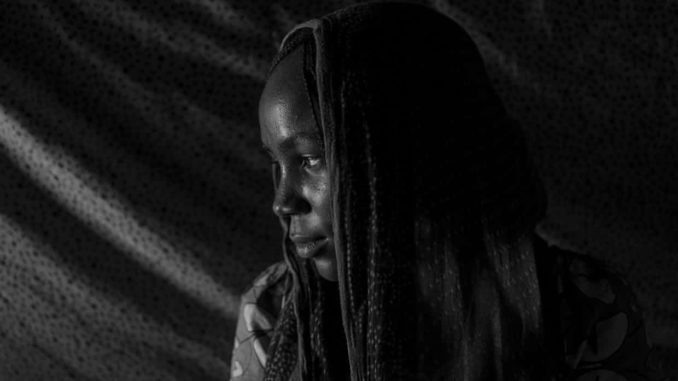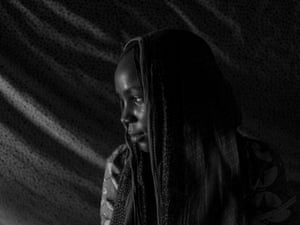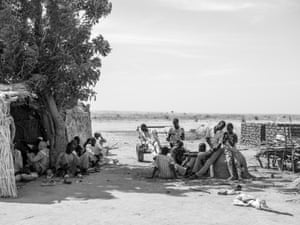
Some water pots and the burnt husks of houses appeared to be all that was left of Hepsata Adjit’s village when she ventured home last month for the first time in a year.
She had made the two-hour journey on foot just for a quick look. Her village of Gashia Midek is on the border between Cameroon and Nigeria, where the risk of attack by Boko Haram remains high, despite gains made over the past year by the countries’ military forces. Adjit, her husband and his brother, who had all walked there together, could not afford to stay long.
It was a lonely sight: no people, and not one of the village’s 3,000 cows, sheep and goats, were left. Adjit remembered how things were before the marauding group arrived, threatening to slit the throats of all the men.
She had married Abiso Gambo, the bulama or village chief, two years before. Her mother had bought them the perfect wedding present: a big, heavy, pinkish wooden bed, with two sets of engraved lines all the way around the base for decoration, held together with hundreds of small nails. Though she was only Gambo’s second wife, Adjit, then 20, was blissfully happy.
But then Boko Haram arrived.
The fallout from the eight-year Boko Haram insurgency is grave: more than 2.4 million people have fled their homes in Nigeria, Niger, Chad and Cameroon. Thousands are dead; thousands more have been raped, beaten and abducted. Many are hungry, and have no access to medical treatment, schools or clean water. Recovery may be slow for these deeply traumatised people, who have lost everything, and the impact of the crisis reverberates through the region and continent.
The Nigerian military’s repeated claims to have won the war against Boko Haramand killed its leader have been met with scorn. But the four affected countries have managed to drive them out of territory they used to control, and many of the insurgents are now thought to be shifting between the labyrinth of islands on a shrinking Lake Chad.
When the militants arrived in Gashia Midek in late 2016, the entire village ran into the surrounding scrubby desert, hiding in clumps of trees.
Eventually a few of the women ventured back. Tentatively, Adjit too returned, to find members of Boko Haram still there.
“I heard some of the women were cooking for their husbands,” she says. “So I joined them. The men were armed, and wearing casual clothes and trainers. When they came to my house, I just pretended to be doing my housework and tried not to look at them. I was scared, but they didn’t touch us.”

The women began to cook and smuggle food to their husbands, still in their hideouts. But one day a woman was caught, and Boko Haram broke all the cooking pots and chased them out of the village.
The whole community fled to Tilde, a settlement deeper inside Cameroon, where they and their ancestors had often taken their animals for pasture.
When they turned up en masse, Tilde’s bulama said they could stay, and the community shared their limited water and the rations of flour and salt given to them by the International Committee of the Red Cross. Gambo began to build a simple house and Adjit built friendships, mainly while waiting for water at the pump.
“We’ve accepted them despite the difficulties, because they’ve suffered in the bush,” says Fani Masao, Adjit’s best friend in Tilde. “Being here isn’t easy for them. They used to be people who had money. Most of them didn’t go to school, but they were rich.”
The village’s wealth, which had been built up over generations, seems impossible to get back.

“We don’t have a single cow,” says Gambo, jogging his wailing baby boy on his lap and trying to distract him with warbling music on his mobile phone.
Hundreds of villages across the region are in this position, and there is no end to the humanitarian crisis in sight. There are more than 300,000 displaced people in Cameroon’s far north, and the number keeps rising.
The couple was comparatively happy in Tilde, but something was bothering Adjit. It was her bed. She knew she had had no choice, but was cross with herself for leaving their prized possession behind.
So when they arrived back in Gashia Midek on their reconnaissance mission, she headed straight for their half-destroyed old bedroom. Under a layer of dirt, there it was.
Working quickly in case Boko Haram was in the vicinity, she, Gambo and his brother took it apart. They tied the heavy pieces up in bundles, balanced them on their heads, and left.

Back in Tilde, they reassembled their bed, hung green printed cloths around it to keep the mosquitoes out, and stuffed their few possessions – a cooking pot with a picture of Chairman Mao on it, an axe, a carved wooden stick for pounding cassava – underneath. Then, Adjit says, they laid back on it and grinned.
Despite being welcomed in Tilde, and now having rescued her bed, Adjit plans to go home as soon as there is peace of a more lasting sort.
“Friendship can’t replace a village,” she says. “But I’ll think about my friends here a lot when I go back.”
END

Be the first to comment